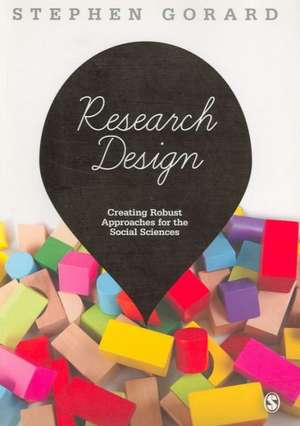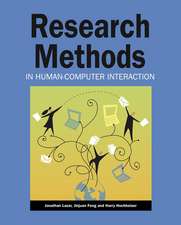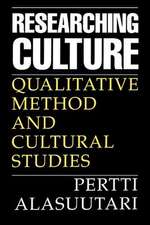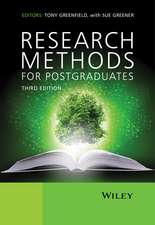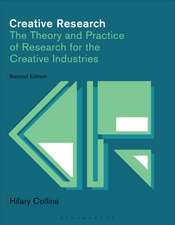Research Design: Creating Robust Approaches for the Social Sciences
Autor Stephen Gorarden Limba Engleză Paperback – 17 feb 2013
Based on the author's teaching on the ESRC Doctoral Training Centre "Masters in Research Methods" at the University of Birmingham, and his ongoing work for the ESRC Researcher Development Initiative, this is an essential text for postgraduate researchers and academics. There is no book like Research Design on the market that addresses all of these issues in an easy to comprehend style, for those who want to design research and make critical judgements about the designs of others.
| Toate formatele și edițiile | Preț | Express |
|---|---|---|
| Paperback (1) | 350.04 lei 3-5 săpt. | +22.20 lei 7-13 zile |
| SAGE Publications – 17 feb 2013 | 350.04 lei 3-5 săpt. | +22.20 lei 7-13 zile |
| Hardback (1) | 1000.91 lei 6-8 săpt. | |
| SAGE Publications – 17 feb 2013 | 1000.91 lei 6-8 săpt. |
Preț: 350.04 lei
Nou
66.98€ • 70.43$ • 55.35£
Carte disponibilă
Livrare economică 26 martie-09 aprilie
Livrare express 12-18 martie pentru 32.19 lei
Specificații
ISBN-10: 1446249026
Pagini: 232
Ilustrații: black & white illustrations, black & white tables, figures
Dimensiuni: 170 x 242 x 17 mm
Greutate: 0.39 kg
Ediția:1
Editura: SAGE Publications
Colecția Sage Publications Ltd
Locul publicării:London, United Kingdom
Recenzii
This well-elaborated book does in no sense exclude traditional views on how to plan, organize and execute a research project, but tries to highlight the new approaches that can help a researcher develop his project as authentically as possible via the appropriate choice of the design for his research. The intended audience of this book can be wide as it can vary from beginners such as students; as it serves as an excellent textbook, teachers who can employ it in teaching, tutoring and working in his research; or workers in the field of research in social sciences.
Research design is an essential element of any research that other important elements of research are reliant on it... Gorard, in this book, has provided a comprehensive view of the research design that may work as a guide for researchers through the journey of research.
It is rare to find a clearly written social science research book that is entirely generalizable across the social sciences and even more rare to find one that is genuinely enjoyable to read. However, with his new book entitled 'Research Design: Creating Robust Approaches for the Social Sciences', Stephen Gorard has managed to achieve the seemingly impossible. The book not only provides an essential introduction to research design in the socials sciences for new researchers, but also acts as a good reminder of best practice design for seasoned researchers. Best of all, throughout the entire book, Gorard provides clear instructions, examples, and rationale for the various types and components of research design.
Cuprins
PART ONE: INTRODUCTION - 'DESIGN' AS DISTINCT FROM METHODS
What Is Research Design?
Introducing Designs in the Cycle of Research
PART TWO: THE PRELIMINARIES OF RESEARCH DESIGN
Identifying Researchable Questions
Warranting Research Claims
The Nature of Causal Claims
PART THREE: PUTTING IT ALL TOGETHER
Identifying the Sample or Cases
Comparing for Comparative Claims
Matters of Timing and Sequence
Evaluating Controlled Interventions
PART FOUR: MORE ADVANCED CONSIDERATIONS
Further Designs for Evaluation
Challenges for Validity
How Big Is a Difference?
A Second Principle of Ethics
PART FIVE: CONCLUSION
Revisiting the Need for Robust Design
Descriere
Research design is of critical importance in social research, despite its relative neglect in many methods resources. Early consideration of design in relation to research questions leads to the elimination or diminution of threats to eventual research claims, by encouraging internal validity and substantially reducing the number of alternative explanations for any finite number of research 'observations'. This new book: discusses the nature of design; gives an introduction to design notation; offers a flexible approach to new designs; looks at a range of standard design models; and presents craft tips for real-life problems and compromises. Most importantly, it provides the rationale for preferring one design over another within any given context. Each section is illustrated with case studies of real work and concludes with suggested readings and topics for discussion in seminars and workshops, making it an ideal textbook for postgraduate research methods courses.
Based on the author's teaching on the ESRC Doctoral Training Centre "Masters in Research Methods" at the University of Birmingham, and his ongoing work for the ESRC Researcher Development Initiative, this is an essential text for postgraduate researchers and academics. There is no book like Research Design on the market that addresses all of these issues in an easy to comprehend style, for those who want to design research and make critical judgements about the designs of others.
